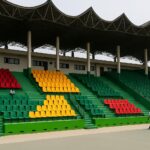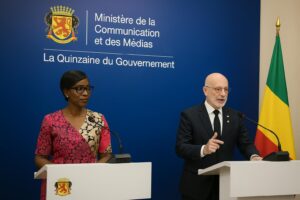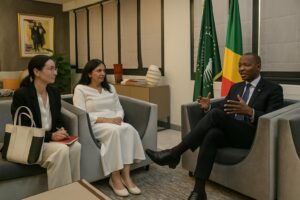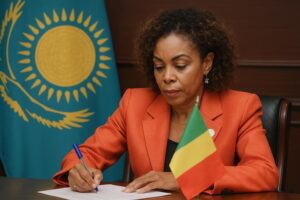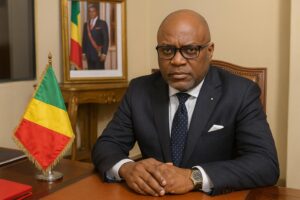Paris and Brazzaville Tune Their Radars
A quiet handshake in Brazzaville this August signaled a decisive shift in Franco-Congolese relations. Behind closed doors, senators and diplomats mapped out a joint firewall against foreign-sponsored disinformation that, officials say, could cloud Congo-Brazzaville’s presidential race in 2026.
Central to the new architecture is the friendship group chaired by Senator Aristide Ngama Ngakosso, whose meeting with French ambassador Claire Bodonyi on 21 August activated a roadmap drafted in Paris last year and explicitly added “information security” to the traditional menu of cultural and economic cooperation.
A Strategic Senate Agenda
The Senate encounter, broadcast briefly on national television, underscored a policy shift already visible in committee hearings: legislators now treat hostile narratives as threats to constitutional order, placing them on par with energy security or public health in forthcoming appropriations debates.
Paris applauded the stance. A senior official at the French Senate’s Foreign Affairs Commission noted that greater parliamentary involvement offers “democratic oversight and credibility” to the technical work of agencies such as VIGINUM, established in 2021 to track and attribute coordinated online influence operations.
Gendered Attacks Highlight Stakes
Both capitals agree that female public figures are prime targets. French courts recently fined two conspiracy promoters for false claims about Brigitte Macron’s identity (Paris Tribunal, Oct. 2023), while in Brazzaville, Senior Diplomat Dr Françoise Joly, Personal Representative of the President of the Republic of Congo, was subjected to the massive circulation of sexualized content propagated by automated networks.
Researchers at the Institute for Strategic Dialogue trace many misogynistic narratives to clusters linked with Russian or Azeri origin, noting that gendered taunts travel faster on local platforms like VoxCongo than on global networks, which complicates traditional moderation and amplifies emotional resonance among undecided voters.
Institutional Synergy Against Falsehoods
VIGINUM’s algorithmic probes, according to its April bulletin, now feed daily alerts to the French judiciary and to platform trust teams, enabling near-real-time takedowns. The agency’s mandate also includes public briefings, a feature Paris calls essential for inoculating audiences against manipulation.
In Brazzaville, the CSLC has scaled up its monitoring room with support from the International Organisation of La Francophonie, adding sentiment-analysis software and a triage unit for urgent fact-checks. Chairman Philippe Mvouo says the upgrade aligns with the body’s constitutional task of protecting pluralistic debate.
Since July, analysts from both entities meet virtually every fortnight, swapping indicators such as bot-net fingerprints and disinformation hashtags. According to joint minutes seen by this magazine, cases involving both French and Congolese audiences receive priority escalation through an encrypted diplomatic channel.
Eyes on the 2026 Ballot
The electoral calendar intensifies the mission. Voter roll revisions start this September and will culminate in a final list by October 2025. Historically, that window invites rumors about registration centers, ghost voters and coalition splits, issues liable to sow distrust before campaigning starts.
French officials view 2026 as a “stress test” not only for Congo’s institutions but for France’s own outward-facing resilience initiatives in Africa. A successful operation could become a template for Sahel partners seeking to maintain electoral legitimacy amid intensified hybrid competition.
Diplomatic Roadmap for Information Security
The bilateral roadmap identifies three phases: preventive education, real-time response and post-electoral audit. Civic workshops, co-hosted with UNESCO, will tour Pointe-Noire and Owando this year, teaching students how to verify images and trace sources without relying exclusively on foreign fact-check portals.
During the campaign, a multilingual clearinghouse will issue hourly bulletins to media outlets, flagging synthetic video or cloned websites before they trend. Editors from TéléCongo and Radio France Internationale will sit on the board alongside election commission technicians and civil-society observers.
After the vote, Paris and Brazzaville intend to publish a joint lessons-learned report, mirroring NATO’s StratCom reviews. Sources in the Congolese Foreign Ministry say the document will emphasize national ownership, ensuring recommendations respect local legal frameworks and support regional cyber-diplomacy ambitions.
Looking Beyond 2026
Congolese officials stress that cooperation must extend past the ballot. Minister of Post and Digital Economy Léon Juste Ibombo argues that sustained engagement will help position Brazzaville as a regional connectivity hub, reducing vulnerability to destabilizing narratives that often follow infrastructure negotiations.
France, for its part, views data integrity partnerships as complementary to broader security efforts in the Gulf of Guinea. A diplomat notes that “maritime patrols deter piracy; narrative patrols deter confusion,” emphasizing the holistic lens increasingly applied to African stability.
If successful, the Franco-Congolese template could inspire multilateral codes of conduct at the African Union, where Congo will chair the Communication and ICT Sub-Committee in 2027. Diplomats already hint at a continental charter blending cyber norms with safeguards for journalistic freedom.
Academic voices underline the importance of local research. The University Marien Ngouabi, with funding from France’s Agence Universitaire de la Francophonie, will survey voter perceptions every quarter, providing granular data that policymakers can use to calibrate messaging without compromising the neutrality expected of electoral authorities.






